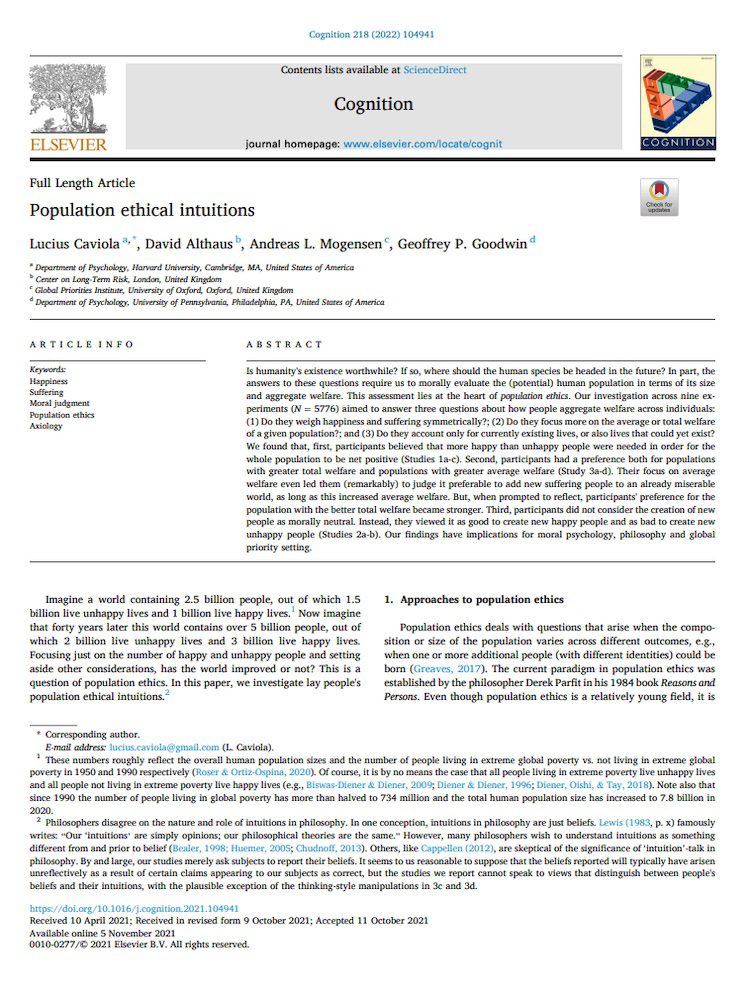Population ethical intuitions
Lucius Caviola (Harvard University), David Althaus (Center on Long-Term Risk), Andreas Mogensen (Global Priorities Institute, University of Oxford) and Geoffrey Goodwin (University of Pennsylvania)
GPI Working Paper No. 3-2024, published in Cognition
Is humanity's existence worthwhile? If so, where should the human species be headed in the future? In part, the answers to these questions require us to morally evaluate the (potential) human population in terms of its size and aggregate welfare. This assessment lies at the heart of population ethics. Our investigation across nine experiments (N = 5776) aimed to answer three questions about how people aggregate welfare across individuals: (1) Do they weigh happiness and suffering symmetrically?; (2) Do they focus more on the average or total welfare of a given population?; and (3) Do they account only for currently existing lives, or also lives that could yet exist? We found that, first, participants believed that more happy than unhappy people were needed in order for the whole population to be net positive (Studies 1a-c). Second, participants had a preference both for populations with greater total welfare and populations with greater average welfare (Study 3a-d). Their focus on average welfare even led them (remarkably) to judge it preferable to add new suffering people to an already miserable world, as long as this increased average welfare. But, when prompted to reflect, participants' preference for the population with the better total welfare became stronger. Third, participants did not consider the creation of new people as morally neutral. Instead, they viewed it as good to create new happy people and as bad to create new unhappy people (Studies 2a-b). Our findings have implications for moral psychology, philosophy and global priority setting.
Other working papers
It Only Takes One: The Psychology of Unilateral Decisions – Joshua Lewis (New York University) et al.
Sometimes, one decision can guarantee that a risky event will happen. For instance, it only took one team of researchers to synthesize and publish the horsepox genome, thus imposing its publication even though other researchers might have refrained for biosecurity reasons. We examine cases where everybody who can impose a given event has the same goal but different information about whether the event furthers that goal. …
Future Suffering and the Non-Identity Problem – Theron Pummer (University of St Andrews)
I present and explore a new version of the Person-Affecting View, according to which reasons to do an act depend wholly on what would be said for or against this act from the points of view of particular individuals. According to my view, (i) there is a morally requiring reason not to bring about lives insofar as they contain suffering (negative welfare), (ii) there is no morally requiring reason to bring about lives insofar as they contain happiness (positive welfare), but (iii) there is a permitting reason to bring about lives insofar as they…
Dynamic public good provision under time preference heterogeneity – Philip Trammell (Global Priorities Institute and Department of Economics, University of Oxford)
I explore the implications of time preference heterogeneity for the private funding of public goods. The assumption that players use a common discount rate is knife-edge: relaxing it yields substantially different equilibria, for two reasons. First, time preference heterogeneity motivates intertemporal polarization, analogous to the polarization seen in a static public good game. In the simplest settings, more patient players spend nothing early in time and less patient players spending nothing later. Second…

